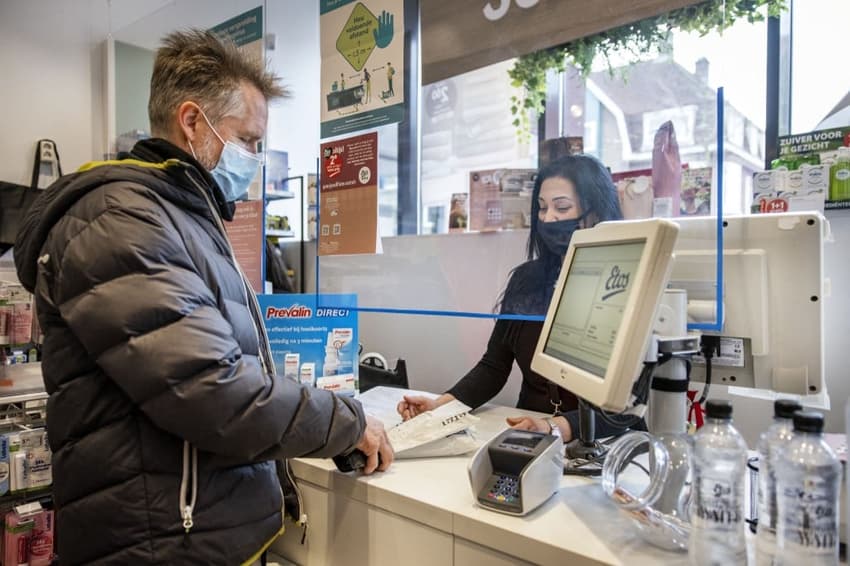Covid-19 screening in Switzerland: Can self-tests really curb the spread of infections?

Tests to be administered at home appeared in Swiss pharmacies last week. But some medical experts warn the results may not be reliable, with the potential of lulling people into a false sense of security.
The tests, manufactured by Switzerland’s Roche pharmaceutical company, are easy to use: a swab from the front of the nose or mouth is taken and placed on the tester. The result is shown 15 minutes later; one stripe means a negative result, and two stripes is positive.
Each resident is entitled to five free tests per month. The government has said that making these tests available free of charge to everyone will prevent new outbreaks.
However, some Swiss health experts are questioning the accuracy of these tests.
Nicolas Vuilleumier, the head of service at the University Hospitals of Geneva (HUG), who is also president of the umbrella organisation of medical laboratories in Switzerland, said that due to their lack of sensitivity, these tests are not reliable screening tools.
"We will have problems of false negatives which will arise in relatively large proportions", Vuilleumier warned in an interview with RTS public broadcaster.
READ MORE: PCR, rapid and self-tests: Your guide to coronavirus testing in Switzerland
The risk, he added, is that infected people will be “falsely reassured by a negative result" and not practice the health measures like wearing of masks and keeping distance.
Even the government, which introduced self-kits as part of its widespread screening strategy, pointed out that “self-tests are much less reliable than PCR tests. A negative test should not lead to a false sense of security or irresponsible behaviour”.
MP Léonore Porchet, a member of the parliamentary Health Commission, warned against “placing blind trust” in this screening method.
“We must tell the public that the use of these self-tests is not a blank check to abandon all protective measures and start kissing and hugging each other again”, she said.
However, “if these self-tests make it possible to detect at least some infections, then it is a good thing”, Porchet added.
Self-tests are part of the free nationwide coronavirus testing programme for people without symptoms that was introduced in the country on January 28th.
Comments
See Also
The tests, manufactured by Switzerland’s Roche pharmaceutical company, are easy to use: a swab from the front of the nose or mouth is taken and placed on the tester. The result is shown 15 minutes later; one stripe means a negative result, and two stripes is positive.
Each resident is entitled to five free tests per month. The government has said that making these tests available free of charge to everyone will prevent new outbreaks.
However, some Swiss health experts are questioning the accuracy of these tests.
Nicolas Vuilleumier, the head of service at the University Hospitals of Geneva (HUG), who is also president of the umbrella organisation of medical laboratories in Switzerland, said that due to their lack of sensitivity, these tests are not reliable screening tools.
"We will have problems of false negatives which will arise in relatively large proportions", Vuilleumier warned in an interview with RTS public broadcaster.
READ MORE: PCR, rapid and self-tests: Your guide to coronavirus testing in Switzerland
The risk, he added, is that infected people will be “falsely reassured by a negative result" and not practice the health measures like wearing of masks and keeping distance.
Even the government, which introduced self-kits as part of its widespread screening strategy, pointed out that “self-tests are much less reliable than PCR tests. A negative test should not lead to a false sense of security or irresponsible behaviour”.
MP Léonore Porchet, a member of the parliamentary Health Commission, warned against “placing blind trust” in this screening method.
“We must tell the public that the use of these self-tests is not a blank check to abandon all protective measures and start kissing and hugging each other again”, she said.
However, “if these self-tests make it possible to detect at least some infections, then it is a good thing”, Porchet added.
Self-tests are part of the free nationwide coronavirus testing programme for people without symptoms that was introduced in the country on January 28th.
Join the conversation in our comments section below. Share your own views and experience and if you have a question or suggestion for our journalists then email us at [email protected].
Please keep comments civil, constructive and on topic – and make sure to read our terms of use before getting involved.
Please log in here to leave a comment.